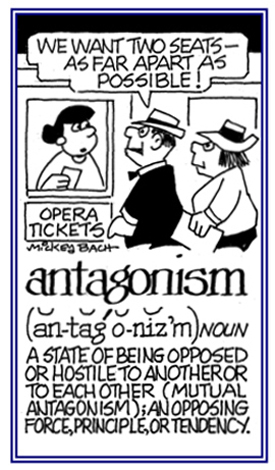-ism, -ismus
(Greek, ismos; Latin, ismus: a suffix: belief in, practice of, condition of, process, characteristic behavior or manner, abnormal state, distinctive feature or trait)
2. In physiology, the interaction between two or more chemical substances in the body that diminishes the effect each of them has individually: Antagonism can be seen in lab rats when the chemical dopamine slows down their movements, as it impedes the usual functions of their physical activities.

Go to this Word A Day Revisited Index
so you can see more of Mickey Bach's cartoons.
2. Thinking that everything is subordinate to humans, or of considering things in relation to mankind and the needs of humans and their destinies.
In other words, anthropomorphism is meant to be a presentation of human characteristics to things that are not human; such as, inanimate objects, animals, or other natural phenomena.
Many mythologies are almost entirely concerned with anthropomorphisms about deities who express human characteristics; such as, jealousy, hatred, or love.
The Greek gods included anthropomorphisms; for example, Zeus and Apollo were often depicted in human form exhibiting both commendable and despicable human traits.
Anthropomorphism is a form of personification applying human or animal qualities to inanimate objects and similarly to adopting the persona of another person with human characteristics and qualities to nonhuman beings, objects, or natural phenomena.
What a strange monster is man; a curiosity, a prodigy, a chaos, a contradiction, judge of all things and a wretched earthworm, repository of truth and sewer of doubt and error, glory and dross of the universe.


